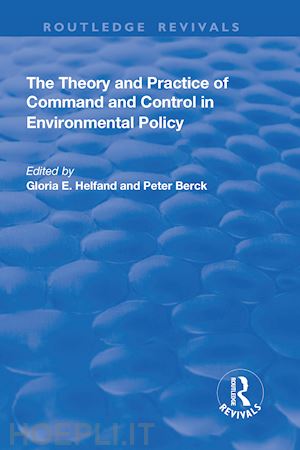Contents: Part I: What is CAC?: Standards versus standards: the effects of different pollution restrictions, Gloria E. Helfand; Performance versus design standards in the regulation of pollution, David Besanko; Agricultural runoff as a nonpoint externality: a theoretical development, Ronald C. Griffin and Daniel W. Bromley. Part II: Sensibly Designed CAC: The new 'Contractarian' paradigm in environmental regulation; David A. Dana; Emission trading vs. rigid regulations in the control of vehicle emissions, Catherine L. Kling; Why CAFE worked, David L. Greene. Part III: Monitoring Costs: When is command-and-control efficient? Institutions, technology and the comparative efficiency of alternative regulatory regimes for environmental protection; Daniel H. Cole and Peter Z. Grossman; The triumph of technology-based standards, Wendy E. Wagner; The use of economic incentives in developing countries: lessons from international experience with industrial air pollution; Allen Blackman and Winston Harrington; Environmental policy for developing countries, Ruth Greenspan Bell and Clifford Russell; Reevaluating the relationship between transferable property rights and command-and-control regulation, Robert W. Hahn and Robert L. Axtell. Part IV: Non-Uniform Conditions: The Net benefits of incentive-based regulation: a case study of environmental standard setting, Wallace E. Oates, Paul R. Portney and Albert M. McGartland; Effluent charges: a critique, Susan Rose-Ackerman; Cost-effective policies to improve urban air quality in Santiago, Chile, Raúl E. O'Ryan. Part V: Uncertainty: Prices vs. quantities, Martin L. Weitzman; Ex Post liability for harm vs. Ex Ante safety regulation: substitutes or complements?, Charles D. Kolstad, Thomas S. Ulen and Gary V. Johnson. Part VI: Imperfect Competition and Information: Regulation of prices and pollution under incomplete information, David P. Baron; Welfare consequences of emission credit trading programs, David A. Malueg; Market power and transferable property rights, Robert W. Hahn. Part VII: Non-Economic Factors: Political Economy and Philosophy: Polluters' profits and political response: direct controls versus taxes, James M. Buchanan and Gordon Tullock; Polluters' profits and political response: direct control versus taxes: comment, Philip R.P. Coelho; Polluters' profits and political response: direct control versus taxes: comment, Robert S. Main and Charles W. Baird; Polluters' profits and political response: direct control versus taxes: comment, Gary W. Yohe; Polluters' profits and political response: direct controls versus taxes: reply, James M. Buchanan and Gordon Tullock; A positive theory of environmental quality regulation, Michael T. Maloney and Robert E. McCormick; Economists and the environmental muddle, Steven Kelman; Regulation by prices and by command, Amihai Glazer and Charles Lave; Explaining market mechanisms, Thomas W. Merrill; Name index.











